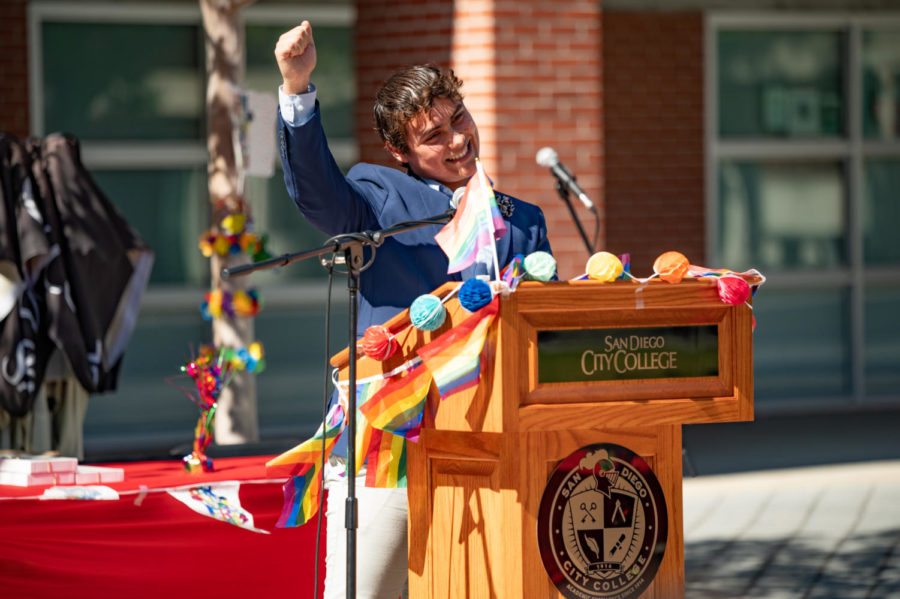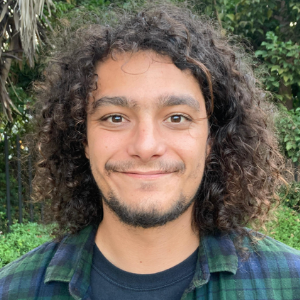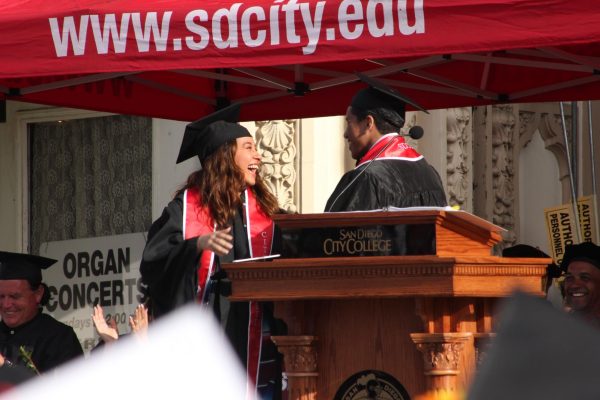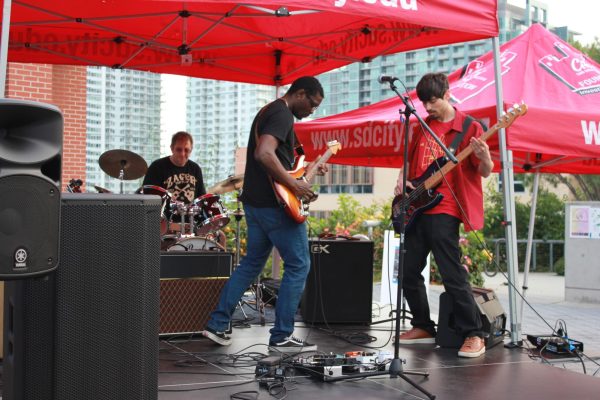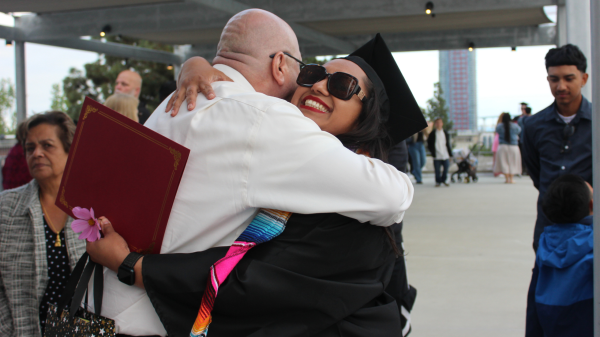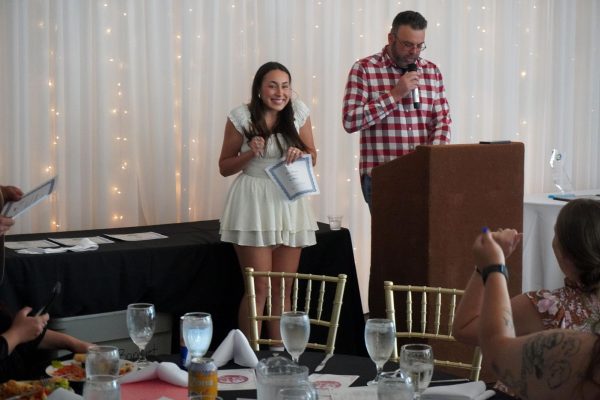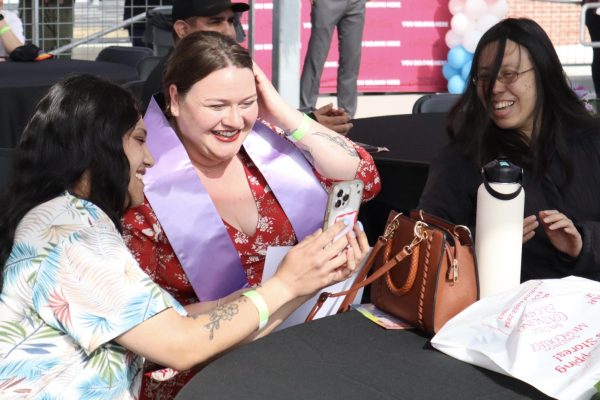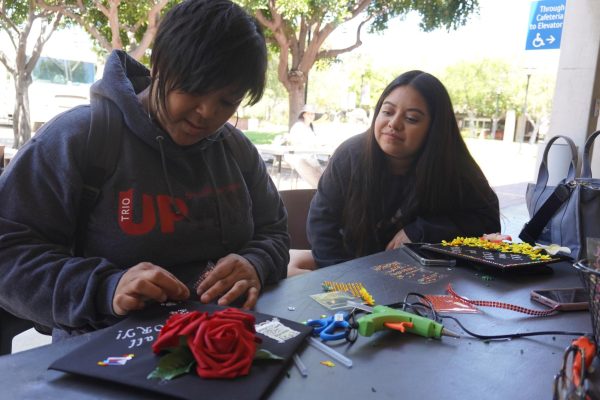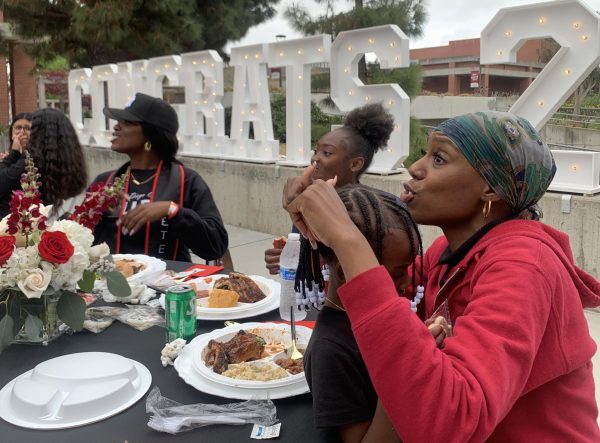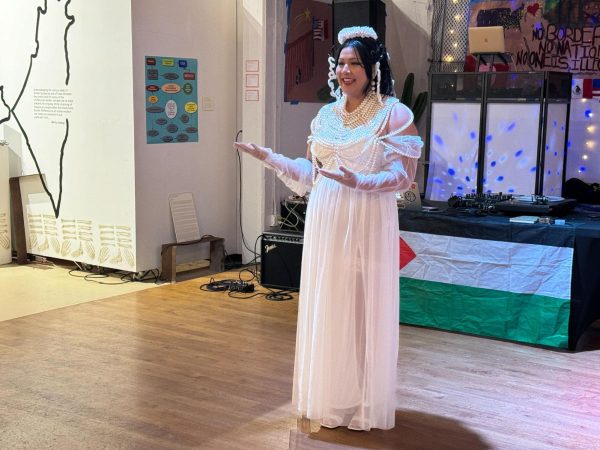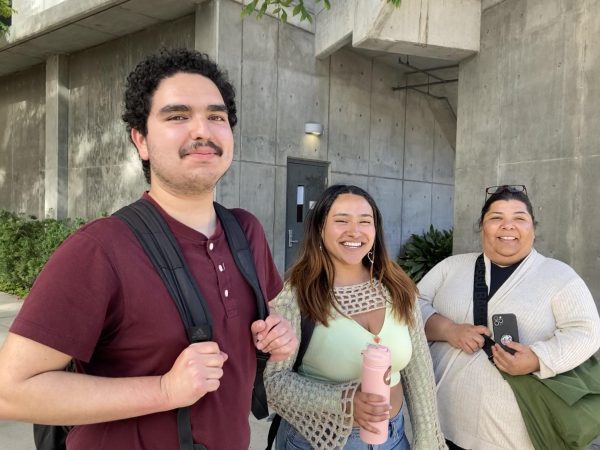City College celebrates its first ‘Lavender Graduation’ ceremony
While most such events are put on by student-run LGBTQIA+ organizations, City’s celebration was spearheaded by a combination of student-support programs
Angel Lopez, a City student involved in the college’s theatre program, raises his fist in celebration during the Lavender Graduation ceremony on May 12, 2022. City College Flickr
May 19, 2022
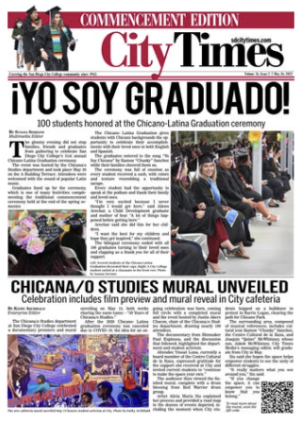 This story appeared in the latest print edition of City Times.
This story appeared in the latest print edition of City Times.
On a sunny mid-May afternoon San Diego City College held a Lavender Graduation ceremony on the campus’ Curran Square.
It was a joyous event by all accounts, with students, family members and faculty gathering to celebrate the achievements of the college’s LGBTQIA+ graduates. The events are something of a complement to traditional commencement ceremonies and aim to give LGBTQIA+ students a place to both recognize and celebrate their identities.
The event was small as far as commencement ceremonies go, with only around thirty attendees. This was largely a function of the word-of-mouth nature of the promotion surrounding it and the difficulty identifying students in this demographic.
“It was a really personal event,” said Rocky Dove, a 20-year-old City graduate working to transfer to UCSD to pursue a degree in cognitive science. “I’m really glad that we were able to make that space for people.”
As far as anyone involved in the planning of the event can tell, it was the first in City’s 108-year history. But that’s not a huge surprise.
The tradition only dates back to 1995 when Ronni Sanlo, then the director of the University of Michigan’s Office of LGBT Affairs, created the inaugural event.
Ashley Burch is a program support technician in the EOPS NextUp office, which supports students who are current and former foster youth. She said she hoped it would be a way to bring together the community and give LGBTQIA+ students a fuller sense of belonging.
“We wanted to have our first annual Lavender Graduation to honor our LGBTQ+ students and to acknowledge their achievements and contributions while they were at City College,” Burch said.
But despite the celebratory nature of the events, both the choice to name them ‘Lavender’ Graduations and Sanlo’s impetus to create them were born from experiences of bigotry.
The color has long played an important, though often prejudicial role, in the LGBTQ community.
Its first connection to queer culture comes from the exalted verses of the 7th-century Greek poet Sappho, who described in her poems the “violet tiaras” worn by her female lovers. Sappho’s work was so deeply influential that the phrase lesbian is derived from the name of the isle on which she lived, Lesbos.
But as history progressed, the hue of purple altered slightly.
A biographer of President Abraham Lincoln described his friendship with a man with whom he shared a bed as having “streaks of lavender.” And during the McCarthy era of American history, “The Lavender Scare” led to thousands of Americans being fired from their government jobs solely due to their sexuality.
But like many groups faced with unjust discrimination and overt oppression, the term has largely been reclaimed and now represents pride, albeit heavy with history.
For Sanlo however, the inspiration for the name comes from an even darker period. In interviews throughout the years, she’s said it combines the black and pink triangles lesbian and gay prisoners, respectively, were forced to wear in Nazi concentration camps.
Sanlo, a lesbian woman, said she was inspired to create Lav Grads, as the ceremonies are often referred to, when she was denied the opportunity to attend the graduation of her biological children because of her sexuality.
Through that experience, she came to more fully understand the pain and exclusion felt by many LGBTQIA+ students and saw the deep need for a way to recognize and honor their experiences.
“Since LGBT students are of every race, ability, nationality, gender, ethnicity, and socioeconomic levels, Lavender Graduation provides a unique opportunity to present a truly multicultural event while acknowledging students who spent most of their college years succumbing to invisibility on their campuses,” Sanlo wrote in a piece for Campus Pride, a nonprofit working to create safer educational environments for LGBTQIA+ students.
In the nearly three decades since that inaugural University of Michigan event, they’ve become a tradition at colleges across the country, from Vermont to Washington to Louisiana.
And now, it’s come to City College.
‘No group is monolithic’
Unlike most collegiate Lavender Graduation ceremonies, which are usually put on by campus LGBTQIA+ clubs or organizations, City’s event was presented through a partnership between Next UP and ¡SUBIR!
¡SUBIR!, an acronym for Students Uplifted by Institutional Reform, is a program founded in 2018 and funded through a pair of federal Title V Department of Education grants awarded to City for its role as a Hispanic-serving institution. It began primarily as a resource center for undocumented students.
But Adan Sanchez, City’s acting dean of student services, said it has since expanded to include a variety of physical meeting spaces and resource centers for different student populations. From hubs for womyn, first-generation students, and veterans, they’ve all been centralized under ¡SUBIR!, with funding coming from the Title V grants.
One of those new additions is the Pride Hub, which was created during the COVID-19 pandemic. Sanchez envisions it as a place for LGBTQIA+ students to socialize and receive services and aims to support students proactively rather than in reaction to challenges.
City’s Lav Grad event was conceived as part of a broader push to develop the Pride Hub.
Sanchez said because data shows LGBTQIA+ students experience significantly more challenges along their educational journey, including lower retention and graduation rates, recognizing their experience could be helpful.
Studies have shown LGBTQIA+ students experience an increased risk of bullying, depression or suicidal thoughts, which may negatively impact their educational success.
Research has also shown if those barriers were removed, and students received more support from campuses, those disparities would be significantly diminished.
To better account for this diversification of offerings, Sanchez said they’ve rebranded from the ¡SUBIR! Dreamer Resource Center, to the ¡SUBIR! Intercultural Center, though much of that language is still yet to be rolled out.
Part of the reason for the diversification of offerings, Sanchez said, is because of the inherent diversity of the Latinx community.
“No group is monolithic,” he said.
From differences in socioeconomic status, gender, sexuality, parental status, employment status and primary language, the needs of each group vary, but they also overlap and intersect.
“I wanted to make sure that when we were building these spaces, we focus in on the intersectionality of these identities,” Sanchez said, “because not one sort of experience is the same.”
‘We’re not going to stand for less’
The other big reason the Lav Grad isn’t powered by a student-run LGBTQIA+ club is because there no longer is one.
Prior to the pandemic, City had the Family Club, whose stated goal was to engage City students in the fight for LGBTQIA+ equality, through activism, education, and advocacy. The club is even still listed on City’s website.
Dove, a peer mentor in the ¡SUBIR! Intercultural Center, said he was part of the push to organize the Family Club prior to the pandemic, but distance learning made organizing increasingly difficult.
The COVID-19 pandemic had a catastrophic effect on clubs’ student recruitment and retention efforts at City.
But Dove questioned if this centralized method of delivering resources to the community is the most effective one, saying in his opinion it wasn’t working all that well.
“We can have all of the signs and webpages and stuff, but unless students have real resources they can connect with, I don’t think the campus is doing enough,” he said.
Sylvia Ramirez, City’s current Title V program activity manager, said because Title V funding is ending, changes will inevitably come to the Pride Hub. One of which, she hopes, will be a more independent Pride Hub.
“I believe it should be a standalone office that has the appropriate counselors, the appropriate connections and support for our students,” Ramirez said.
She said there’s a need to complement the hub’s current programming, which because of Title V funding requirements is primarily focused on ensuring student academic success, with more community engagement activities. As the funding ends, and the Pride Hub’s cost is absorbed by City’s general budget, it will have more freedom to pursue a wider range of programming.
But despite the challenges, Ramirez has been encouraged by what she sees as a renewed commitment by faculty to support LGBTQIA+ students. Especially as a wave of reactionary anti-LGBTQIA+ initiatives has swept the nation.
“We’re not going to stand for less, we’ve learned how to be vocal, and we’ve learned how to group together,” Ramirez said.
“On this campus right now a lot of like-minded people are getting together so that we can see change happen while we’re here,” she continued.
“And I think it’s a great thing.”


